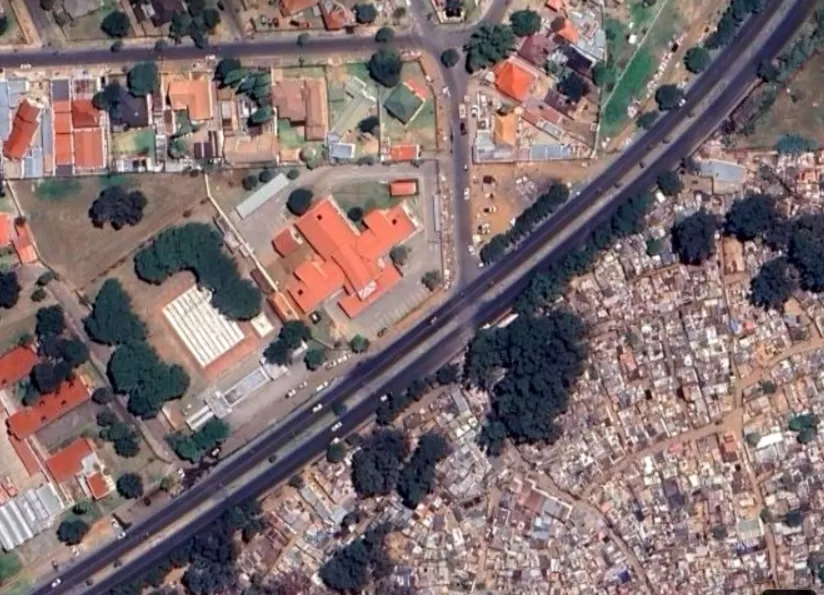Two years ago, South Africa was named the most unequal country in the world in a World Bank report. This in a country where apartheid was dismantled 30 years ago. As the country goes to the polls on 29 May, inequality is proving to be at the heart of the debate which is stoking claims that freedom of expression is under threat.
Arthur Shopola, a lecturer in the Department of Public Administration and Local Government at South Africa’s North West University, says nothing has changed since the World Bank report and that failure to deliver for the electorate is due to ineffective leadership and poor management of public resources, corruption as well as maladministration.
He said South African citizens continue to enjoy some rights brought about by the democratic regime, particularly universal suffrage, but the ballot has not translated into the tangible results that people yearn for.
“Poverty, high levels of unemployment and inequality remain pressing issues for ordinary South Africans,” Shopola told Index.
Crucially, the land question remains unaddressed, he said.
“The right to equality is an area that the state has failed to promote. Also, everyone has a right to access clean water. This is one of the rights that SA has dismally failed. Just recently, over 100 people in Hamanskraal (Gauteng province) were admitted and many died because they were supplied with unclean water. There are many people in various parts of the country who still drink and wash clothes from the rivers. It’s sad,” he added.
Earlier this month, the main opposition party, the Democratic Alliance (DA), released an advertisement featuring the burning of the South African national flag. President Cyril Ramaphosa criticised the advert, telling the BBC: “South Africans are more educated, empowered and healthier than they were under apartheid,” and people must not threaten that progress.
South Africa’s national broadcaster banned the advertisement, sparking outrage among freedom of expression advocates who said it sets a dangerous precedent. They also contended that the Constitutional Court has recognised that the right to freedom of expression is not limited to statements that are moderate and inoffensive, but extends to those that offend, shock or disturb.
DA leader John Steenhuisen, in a speech delivered on 9 May, said the advertisement is the most successful political advertisement in South Africa’s democratic history – with over four millions views online and millions more on radio and TV. He said it symbolises “how South Africa’s flag, Constitution and future would burn to ashes if voters allow destructive populists to seize power”.
Steenhuisen also condemned the banning of the advert.
“This attack on free speech and suppression of the opposition only confirms the urgency of the DA’s warning contained in the ad. The ANC’s clampdown on freedom of speech to protect itself from criticism is but a small foretaste of what is to come under the ANC/EFF Doomsday Coalition, which will burn our flag, burn our democracy and burn our economy to the ground,” he said.
Steenhuisen talked of the hardships that ordinary South Africans now face – the single mother struggling to put food on the table for her children, the unemployed father who has lost his job because the ANC destroyed the economy and the young graduate who has been reduced to begging on street corners.
The alarm over the possible direction of South Africa is not only shared by South Africans in general or the DA in particular. Vitalis Dhokwani, a Zimbabwean living in South Africa since 2018 after fleeing economic ruin back home, said there are tell-tale signs that the country could head in the direction of Zimbabwe. Dhokwani said South Africa is going through what Zimbabwe went through: corruption by political elites, abuse of the law, lack of accountability and transparency. He said there are similarities between Zimbabwe’s ruling party, Zanu-PF, and South Africa’s ANC, both liberation parties who have betrayed promises of independence.
“People’s spending power has gone down and the cost of living has gone up. Health services were free to everyone but now even locals are paying,” said Dhokwani.
“South Africa is going the same way Zimbabwe went: corruption, rampant abuse of power. I really feel you can’t separate the ANC and Zanu-PF. These revolution parties abuse the tag of revolution parties. Just because they liberated the country does not mean they must make themselves rich while the poor get poorer.”
He criticised political parties who blame immigrants for South Africa’s problems. Dhokwani said South Africa is suffering from misgovernance and corruption from the people who were put in office.
“We can’t blame immigrants for failure of councils. How can one blame foreigners on service deliveries from council? Generally most immigrants are not formally employed they do self-employed jobs and some immigrants have even created for employment for locals as jobs are hard to come by,” he said.
In a statement on 6 May, Human Rights Watch said the scapegoating and demonising of foreign nationals by candidates in South Africa’s general elections risks stoking xenophobic violence. The human rights watchdog detailed a number of cases in which South African politicians had promoted hate against immigrants. It said candidates were pushing a narrative not just that migration is out of control, but blaming undocumented migrants for the country’s ills and engaging in xenophobia.
Shopola, the public administration lecturer, said politicians blaming immigrants were embarking on an opportunistic theorisation of the problems facing SA. “It’s a misdiagnosis. My worry with that theorisation is that it is loaded with hatred, not only hatred but self-hate and disingenuousness by those who push the narrative,” he said.
“What is failing is the laws and systems put in place to attend to issues of land, employment and the economy which is still in the hands of the few.”





